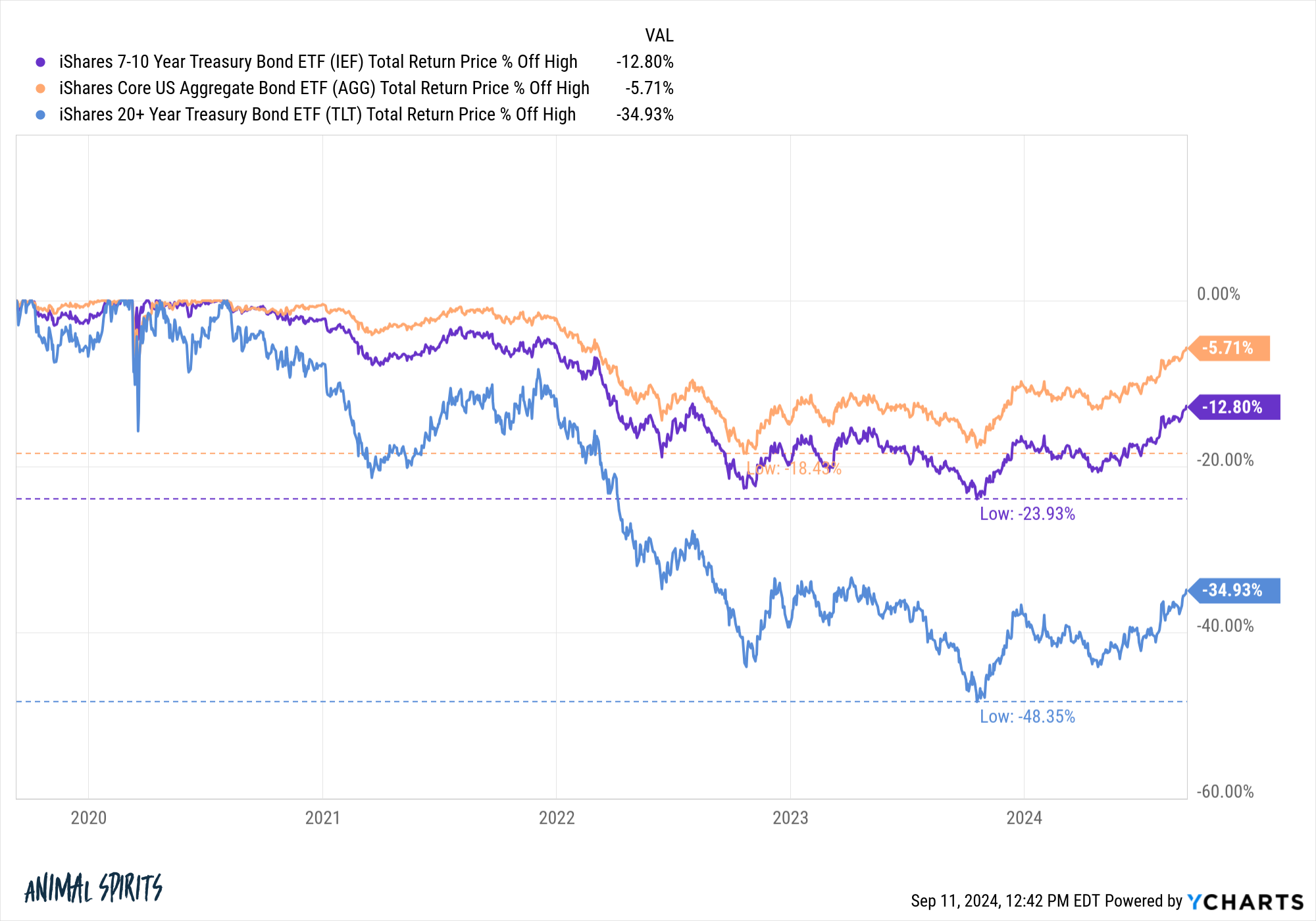What Occurs to the Cash Market Money on the Sidelines? – Cyber Tech
A reader asks:
I’ve a inventory market principle. The massive amount of money in cash markets, HYSAs, and so on. signifies that a “down” day/days for the inventory market will shortly be reversed by shopping for the dip. And this can proceed till money balances drop considerably. Ideas?
There may be lots of money sitting in cash market funds proper now:
That’s $6.3 trillion, which is almost double the quantity that was in these funds pre-pandemic.
It is sensible. The Fed jacked up short-term rates of interest. You will get in extra of 5% in these funds. Lengthy-duration bonds carry a lot greater rate of interest threat and bought crushed when charges rose. These are short-term debt devices that don’t go down in worth on a nominal foundation.
Cash market funds have been a win-win for traders who wanted some mixture of yield, volatility safety and liquidity these previous few years.
However what occurs when the Fed begins slicing charges?
Yields on cash market funds will fall. It’s doable the Fed might lower charges reasonably shortly. These 5% yields might flip into 2-3% yields in a comparatively quick time period if inflation retains falling, the financial system slows even additional or some mixture of the 2.
It’s a good query to ask whether or not this money on the sidelines will present a buffer to falling inventory costs.
Let’s begin with some quantitative evaluation earlier than going into the extra qualitative facets of this principle.
The Federal Reserve has quarterly information on cash market property going again to the mid-Nineteen Seventies. I appeared on the change in quarterly cash market property and the corresponding quarterly return on the S&P 500.
It was exhausting to seek out a lot of a powerful relationship a technique or one other:

To check this principle, I appeared on the returns within the down quarters for the inventory market to see if it impacted cash market flows. You have been greater than twice as prone to see property move into cash markets in a down quarter than out of cash markets.
So it’s not like traders have used cash market funds as a type of money on the sidelines previously.
However what about yields?
We’re heading right into a rate-cutting cycle. Does money move out of cash market funds as yields fall?
Not essentially. Right here’s a take a look at property in cash market funds versus yields:

The falling fee environments are highlighted on the chart. From 2005-2009, yields fell however property in cash markets went skyward. The identical factor occurred throughout the pandemic.1
So whereas it could be good to imagine traders can be chomping on the bit to place money to work throughout a down market, the other is extra possible. Folks get scared when shares are falling and put extra money in money.
Will that occur the following time shares fall?
We will see.
It’s additionally value declaring cash market funds solely date again to the mid-Nineteen Seventies. Right here’s a fast historical past lesson I wrote about these funds in a earlier piece:
Vanguard is synonymous with index funds however it was cash market funds that carried Jack Bogle’s firm within the Nineteen Eighties as a result of rates of interest have been so excessive.
Banks was once capped on the quantity of curiosity they might pay. Then the primary cash market fund got here alongside that allowed individuals to place their cash to work with a financial institution by way of prevailing rates of interest.
By 1981, Vanguard held simply 5.8% of mutual fund trade property. That quantity dropped to five.2% by 1985 and 4.1% by 1987. Their hottest fund sequence, the Wellington Funds, noticed 83 consecutive months of outflows.
In the course of the Nineteen Eighties, mutual fund property jumped from $241 billion to $1.5 trillion. The cost was led by cash market funds, which soared from $2 billion to $570 billion, accounting for nearly half the rise.
So it’s exhausting to pinpoint how a lot the inventory market impacted the flows as a result of they have been a brand new fund class within the Nineteen Seventies and Nineteen Eighties.
The opposite a part of the equation is how a lot of the increase in cash market funds got here from bonds or different sources of mounted revenue?
Bonds simply skilled their worst bear market in historical past:

Absolutely some portion of the trillions of {dollars} that flowed into cash markets got here from bonds.
When cash market yields fall, there may be in all probability a stronger case to be made for that cash to enter bonds than shares since money can act as a type of mounted revenue.
Plus, there’s a child boomer retirement facet of the allocation query. Thousands and thousands of child boomers are already retired. Thousands and thousands extra will probably be retiring over the course of this decade. Most retirees de-risk a portion of their portfolios in retirement as a result of they don’t need/want as a lot volatility.
What if a few of these property are sticky?
It’s definitely a chance.
So whereas a few of that money on the sidelines might discover its means into the inventory market, I wouldn’t wager on the concept that cash market flows will save the inventory market when it falls.
I coated this query on the most recent version of Ask the Compound:
Our resident property professional, Taylor Hollis, joined me on the present this week to debate questions on CD charges, how trusts work, shield your funds from an sickness within the household and paying off scholar loans with a 401k mortgage.
Additional Studying:
How Particular person Retirement Accounts Modified the Inventory Market Without end
1Property did fall after which stagnated popping out of the Nice Monetary Disaster however that was a interval with years of 0% yields. I’m truly stunned property didn’t fall additional within the 2010s.



